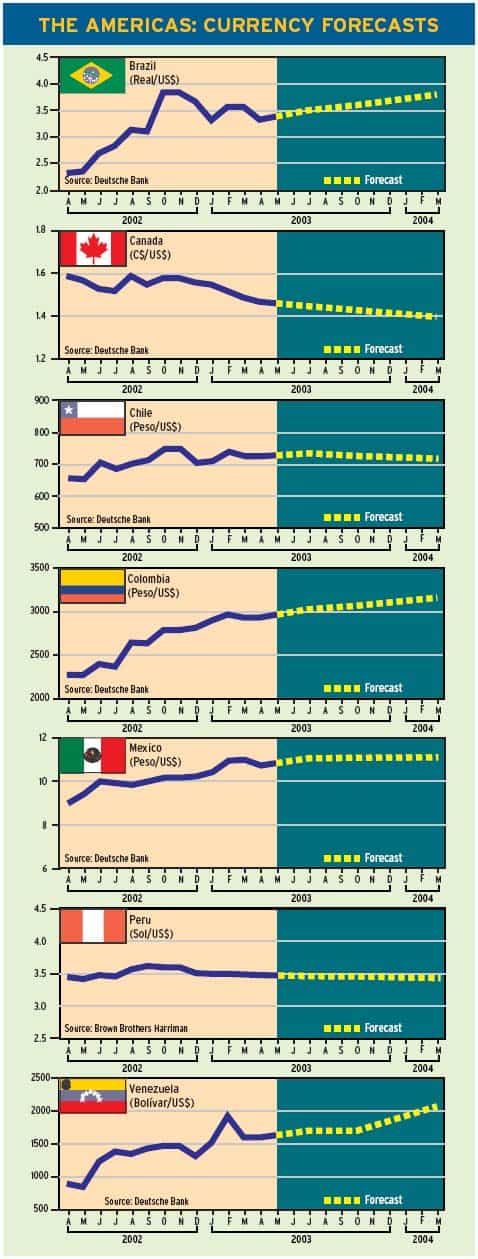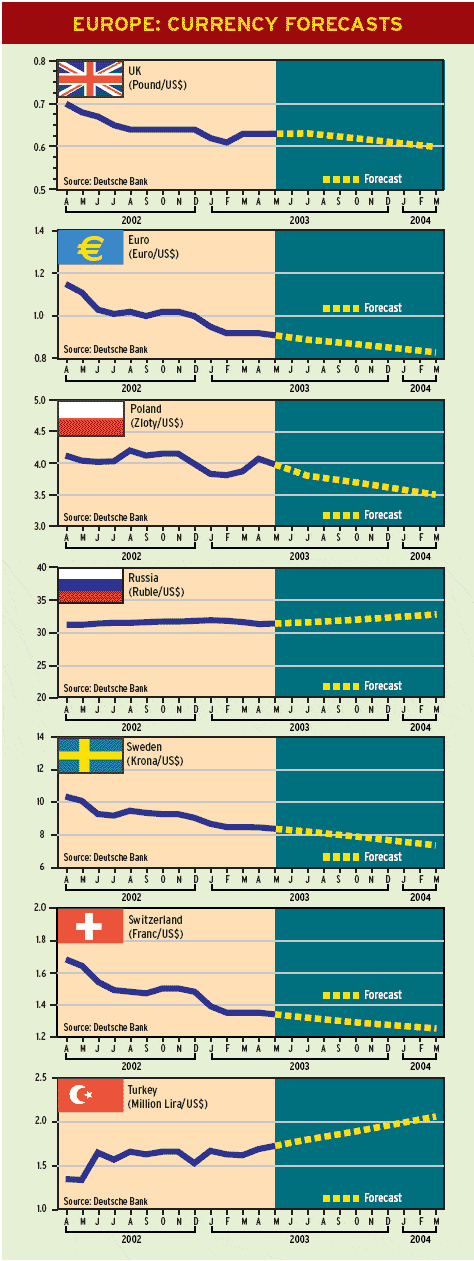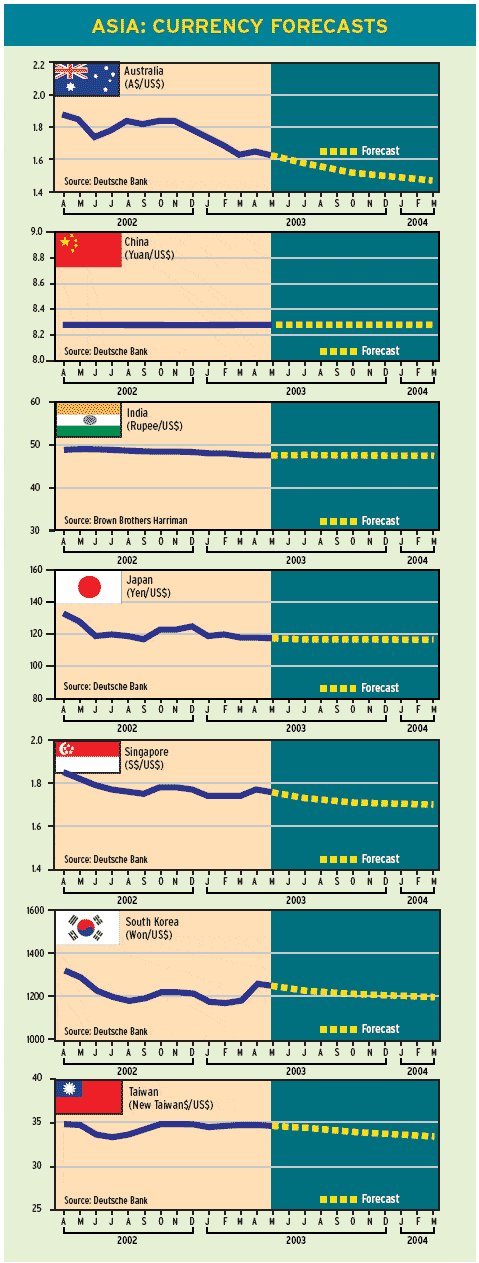THE AMERICAS

While war news out of Iraq was the main determinant of currency movements in April, the US dollar could resume falling once the focus of market participants inevitably returns to economic fundamentals, analysts say.
The dollar is in a longterm, secular depreciating trend that has yet to reach its conclusion, says David Mozina, head of Group-of- 10 foreign exchange strategy at Bank of America in New York.
Underlying fundamentals have not changed during the course of this war, and US economic numbers seem to be even more shaky than in the recent past, Mozina says.
With the US currentaccount deficit running at a record 5.2% of gross domestic product and rising at a time when foreign demand for dollar-denominated assets is tepid, the greenback is likely to come under renewed pressure, Mozina forecasts.
Beyond the war, lies the threat of dual deficits for the United States, he says, referring to the budget and trade deficits.And while US interest rates have been reduced to 40-year lows to spur the economy, the economic recovery in the United States continues to remain shrouded in uncertainty, he adds.
Until capital flows return to US shores, the euro will continue to benefit the most from dollar weakness in the medium to long term, according to the Bank of America analyst.
While US economic growth could rebound after the war, the recovery wont be rapid, with big questions still facing longterm growth prospects, says Lara Rhame, senior currency economist at Brown Brothers Harriman in New York.
US economic growth at present is practically nonexistent, she says, but many market participants believe that when uncertainty dissipates in the second quarter, the US economy will bolt out of the gate into a robust, solid recovery.
We expect a rockier road, Rhame says.We stick with our forecast that the economy will see only modest growth this year, below-potential growth that will cause a broad dollar erosion.
According to Rhame, peace will bring its own uncertainties.While the dollar could experience a significant victory rally, the upturn will be shortlived, she says.
The fact is, the economy was not firing on all cylinders before the war began, and we do not expect all cylinders to be firing after the war ends, Rhame says.
Widening budget deficits have often, but not always, gone hand-inhand with a stronger US dollar, as expansionary policy has brightened growth expectations, says Rebecca Patterson, global currency strategist at JPMorganChase in New York.
However, history also suggests a pattern in which the dollar falls in the years following such fiscal easing, especially if the budget deficit is coupled with a currentaccount deficit and economic growth that proves inadequate to attract sufficient capital inflows, Patterson adds.
The growing budget deficit is more a reflection of a weak US economy, and a riskier world requiring greater defense spending, than it is a blueprint for a sustained bounce in growth, she says.
We already forecast a gradually weaker dollar in the year or so ahead, largely as a result of our expectations that foreign demand for US assets will be insufficient to finance the widening currentaccount deficit, Patterson says.Should these flow dynamics come alongside economic growth that disappoints consensus forecasts, the dollar will likely weaken further, she says.
EUROPE Euro Could Get Lift From End to Iraq War

France and Germany will not pay an economic price for failing to back the United States and Britain in the Iraq war, analysts say.
British Prime Minister Tony Blair is in favor of European monetary union and will work hard to heal any rift between Britain and the Continent, says Ashraf Laidi, chief currency analyst at MG Financial Group in New York.
Meanwhile, Monetary Affairs Commissioner Pedro Solbes says the Iraq hostilities may constitute exceptional circumstances that could warrant a relaxation of the European Unions budget rules. This could be particularly helpful to France and Germany, says Lara Rhame of Brown Brothers Harriman.
The euro zone is perhaps best placed to benefit from a quick and clean resolution to hostilities, Rhame says. Capacity utilization in the region is only slightly below its long-term average, while consumer spending relative to gross domestic product is only modestly above its norm, she says.
If the current uncertainty dissipates quickly, the chances of a robust cyclical recovery (in the euro zone) remain high, according to Rhame.
The trade-weighted value of the euro has risen almost 15% in the past year, which will have some negative impact on euro zone growth this year and in 2004, Rhame says.The loss of EU competitiveness could be magnified by weak external demand, she adds. Brown Brothers expects US growth of just 2.3% for 2003, and Japanese growth of only 1.6%.
We think, however, that robust euro-zone recovery remains a good bet later this year, Rhame says.The decline of 75 basis points in interest rates since December 2002, and an expected easing of another 25 basis points in the second quarter of 2003 will increasingly boost domestic demand in the second half of this year, she says.
The recent drop in oil prices and slowdown in inflation will boost purchasing power and consumer spending, she adds.
ASIA Yen-Negative Factors Balance Dollars Flaws
The list of negative factors for the Japanese yen is at least as long as the large number of problems facing the US dollar, which should result in a standoff in the currency pairs value, analysts say.
Marshall Gittler, senior currency strategist at Deutsche Bank in Tokyo, says the slipping popularity of Prime Minister Junichiro Koizumi increases the risk that he might backtrack further on reform, particularly with the banks.
Other hurdles for the Japanese currency include a declining stock market that is likely to spur capital outflows by foreign investors, record low interest rates, tensions with North Korea, and the Japanese governments determination to hold the line on yen appreciation, Gittler says.
Given sluggish growth, a falling stock market, and an ever-present threat of a financial crisis, the Bank of Japan is likely to implement an aggressively loose monetary policy in order to fend off a deflationary spiral, he says.
Of course, there are some positives for the yen as well, according to Gittler. The most significant one, he says, is the huge issuance of Japanese government bonds, which will absorb surplus savings that would otherwise go abroad and weaken the yen.
The yen held relatively steady versus the dollar in the first quarter of 2003, but fell relative to the euro, resulting in a 2.5% decline in trade-weighted terms.
This pattern was the result of a tug-of-war between risk aversion and intervention, says John Normand, global currency strategist at JPMorganChase in London.
We expect this tension to persist in the current quarter, thus sustaining a trading range of about 117 to 123 for the yen against the dollar, he says.
Newly installed Bank of Japan Governor Toshihiko Fukui has focused more on addressing near-term risk to financial stability given the Iraq war, than on long-term reflationary policies which would drive the yen significantly lower, Normand says.
Meanwhile, the Japanese authorities have continued their covert interventions in overseas foreign exchange markets to keep the yen from rising.

Gordon Platt



